Analyzing Principles of Care and Legislation for Vulnerable People
VerifiedAdded on 2023/06/09
|12
|4167
|244
Report
AI Summary
This report provides a comprehensive overview of the principles of care and their significance in safeguarding the rights of vulnerable individuals within the healthcare and social care sectors. It explores how these principles ensure fair and appropriate care services, protect against mistreatment, and improve the quality of life for those unable to care for themselves due to mental or physical limitations. The report also examines the four key principles of healthcare ethics—autonomy, beneficence, non-maleficence, and justice—and their application in upholding patient rights. Furthermore, it addresses the issues of care and control in health and social care, including challenges related to technology, healthcare costs, staffing shortages, and access to medical facilities, particularly for those in rural areas or facing financial difficulties. The importance of legislation, such as the Care Act 2014 and the Health and Social Care Act 2012, in protecting vulnerable adults from harm and abuse is also highlighted.
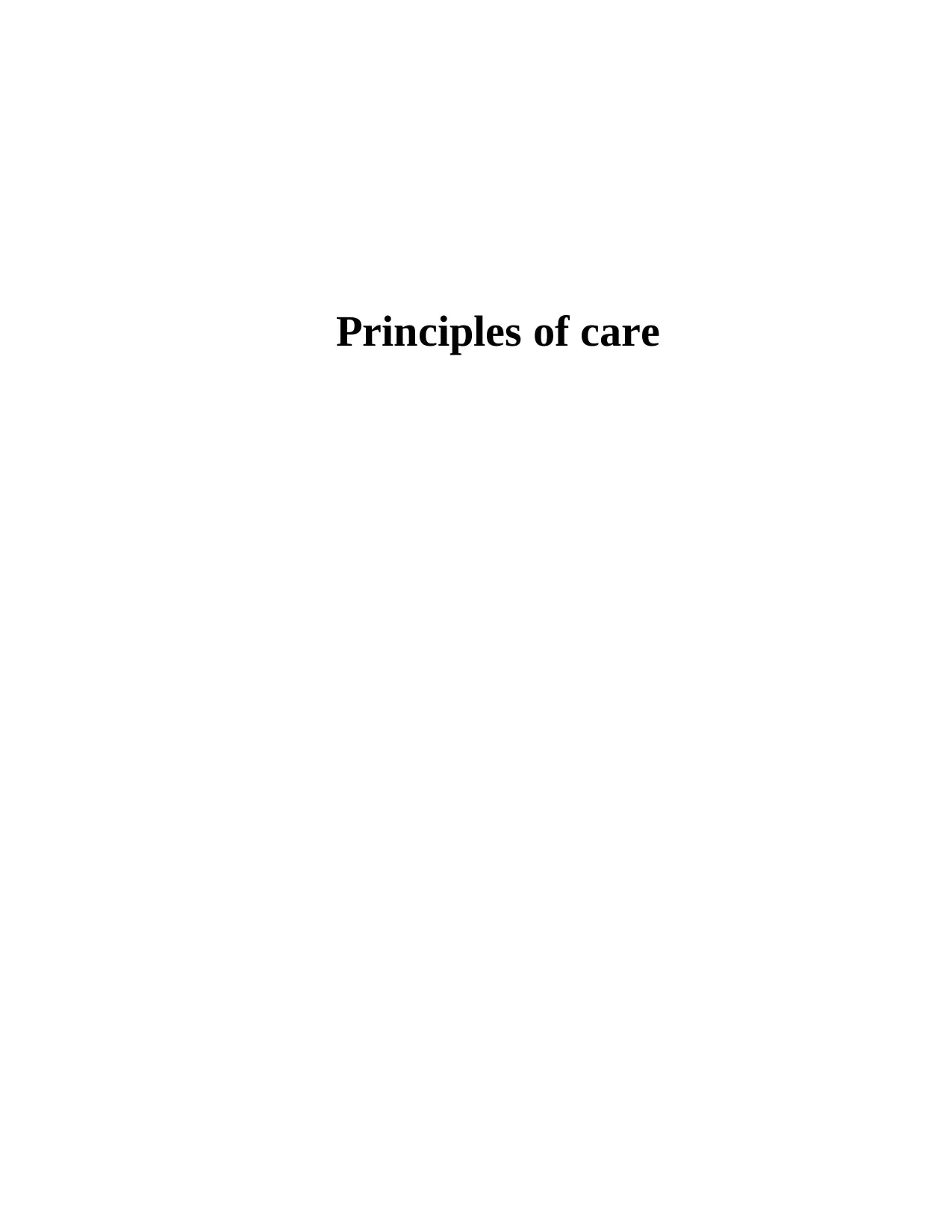
Principles of care
Paraphrase This Document
Need a fresh take? Get an instant paraphrase of this document with our AI Paraphraser
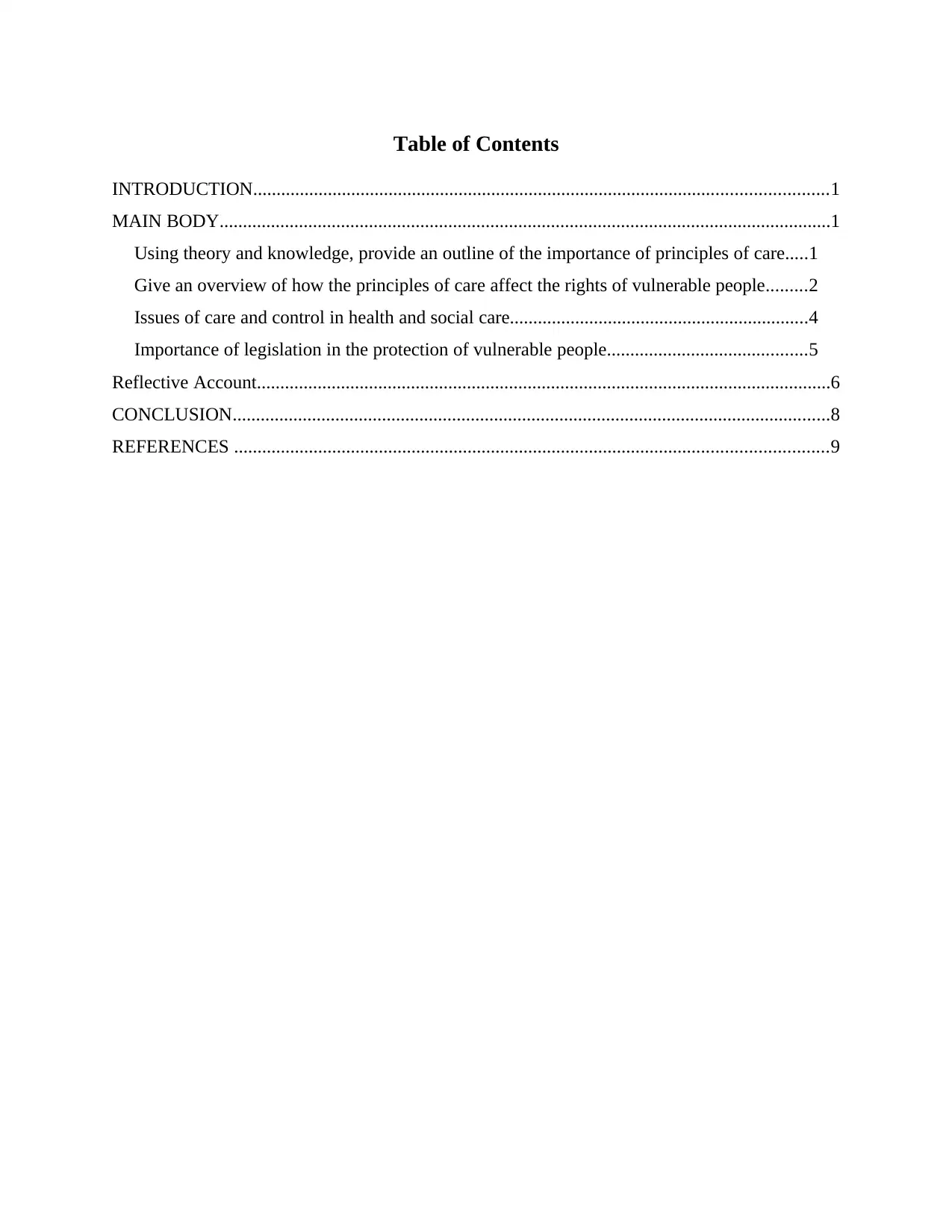
Table of Contents
INTRODUCTION...........................................................................................................................1
MAIN BODY...................................................................................................................................1
Using theory and knowledge, provide an outline of the importance of principles of care.....1
Give an overview of how the principles of care affect the rights of vulnerable people.........2
Issues of care and control in health and social care................................................................4
Importance of legislation in the protection of vulnerable people...........................................5
Reflective Account...........................................................................................................................6
CONCLUSION................................................................................................................................8
REFERENCES ...............................................................................................................................9
INTRODUCTION...........................................................................................................................1
MAIN BODY...................................................................................................................................1
Using theory and knowledge, provide an outline of the importance of principles of care.....1
Give an overview of how the principles of care affect the rights of vulnerable people.........2
Issues of care and control in health and social care................................................................4
Importance of legislation in the protection of vulnerable people...........................................5
Reflective Account...........................................................................................................................6
CONCLUSION................................................................................................................................8
REFERENCES ...............................................................................................................................9
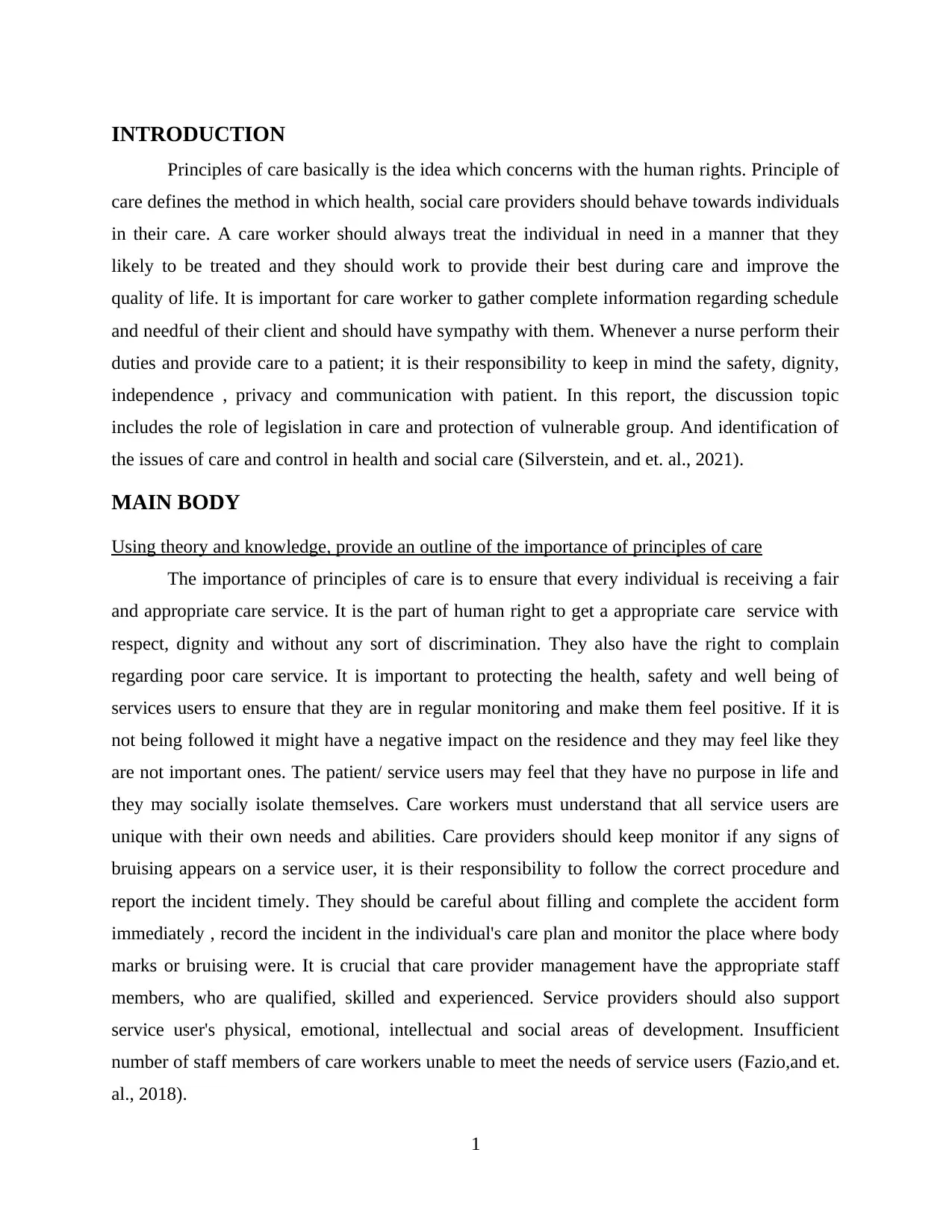
INTRODUCTION
Principles of care basically is the idea which concerns with the human rights. Principle of
care defines the method in which health, social care providers should behave towards individuals
in their care. A care worker should always treat the individual in need in a manner that they
likely to be treated and they should work to provide their best during care and improve the
quality of life. It is important for care worker to gather complete information regarding schedule
and needful of their client and should have sympathy with them. Whenever a nurse perform their
duties and provide care to a patient; it is their responsibility to keep in mind the safety, dignity,
independence , privacy and communication with patient. In this report, the discussion topic
includes the role of legislation in care and protection of vulnerable group. And identification of
the issues of care and control in health and social care (Silverstein, and et. al., 2021).
MAIN BODY
Using theory and knowledge, provide an outline of the importance of principles of care
The importance of principles of care is to ensure that every individual is receiving a fair
and appropriate care service. It is the part of human right to get a appropriate care service with
respect, dignity and without any sort of discrimination. They also have the right to complain
regarding poor care service. It is important to protecting the health, safety and well being of
services users to ensure that they are in regular monitoring and make them feel positive. If it is
not being followed it might have a negative impact on the residence and they may feel like they
are not important ones. The patient/ service users may feel that they have no purpose in life and
they may socially isolate themselves. Care workers must understand that all service users are
unique with their own needs and abilities. Care providers should keep monitor if any signs of
bruising appears on a service user, it is their responsibility to follow the correct procedure and
report the incident timely. They should be careful about filling and complete the accident form
immediately , record the incident in the individual's care plan and monitor the place where body
marks or bruising were. It is crucial that care provider management have the appropriate staff
members, who are qualified, skilled and experienced. Service providers should also support
service user's physical, emotional, intellectual and social areas of development. Insufficient
number of staff members of care workers unable to meet the needs of service users (Fazio,and et.
al., 2018).
1
Principles of care basically is the idea which concerns with the human rights. Principle of
care defines the method in which health, social care providers should behave towards individuals
in their care. A care worker should always treat the individual in need in a manner that they
likely to be treated and they should work to provide their best during care and improve the
quality of life. It is important for care worker to gather complete information regarding schedule
and needful of their client and should have sympathy with them. Whenever a nurse perform their
duties and provide care to a patient; it is their responsibility to keep in mind the safety, dignity,
independence , privacy and communication with patient. In this report, the discussion topic
includes the role of legislation in care and protection of vulnerable group. And identification of
the issues of care and control in health and social care (Silverstein, and et. al., 2021).
MAIN BODY
Using theory and knowledge, provide an outline of the importance of principles of care
The importance of principles of care is to ensure that every individual is receiving a fair
and appropriate care service. It is the part of human right to get a appropriate care service with
respect, dignity and without any sort of discrimination. They also have the right to complain
regarding poor care service. It is important to protecting the health, safety and well being of
services users to ensure that they are in regular monitoring and make them feel positive. If it is
not being followed it might have a negative impact on the residence and they may feel like they
are not important ones. The patient/ service users may feel that they have no purpose in life and
they may socially isolate themselves. Care workers must understand that all service users are
unique with their own needs and abilities. Care providers should keep monitor if any signs of
bruising appears on a service user, it is their responsibility to follow the correct procedure and
report the incident timely. They should be careful about filling and complete the accident form
immediately , record the incident in the individual's care plan and monitor the place where body
marks or bruising were. It is crucial that care provider management have the appropriate staff
members, who are qualified, skilled and experienced. Service providers should also support
service user's physical, emotional, intellectual and social areas of development. Insufficient
number of staff members of care workers unable to meet the needs of service users (Fazio,and et.
al., 2018).
1
⊘ This is a preview!⊘
Do you want full access?
Subscribe today to unlock all pages.

Trusted by 1+ million students worldwide
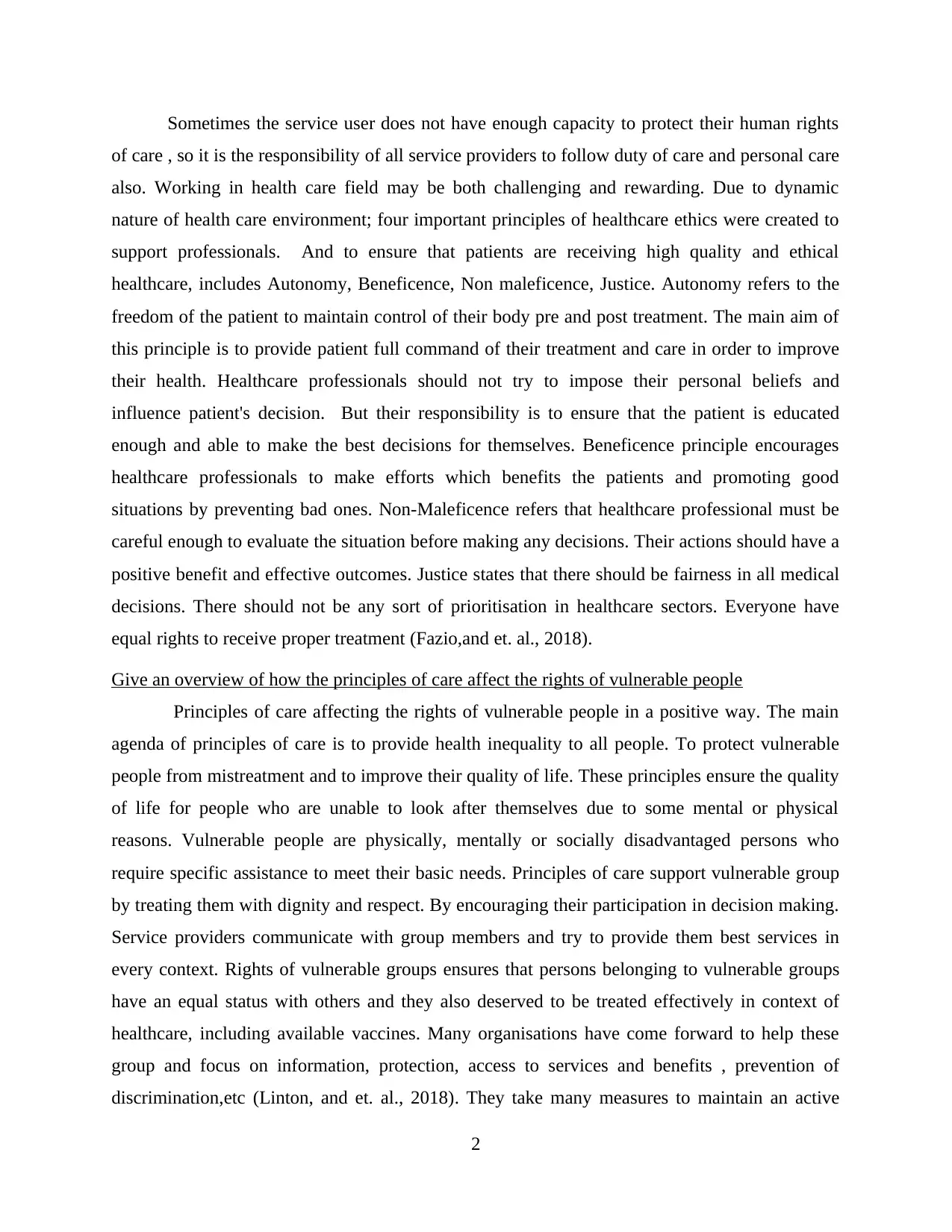
Sometimes the service user does not have enough capacity to protect their human rights
of care , so it is the responsibility of all service providers to follow duty of care and personal care
also. Working in health care field may be both challenging and rewarding. Due to dynamic
nature of health care environment; four important principles of healthcare ethics were created to
support professionals. And to ensure that patients are receiving high quality and ethical
healthcare, includes Autonomy, Beneficence, Non maleficence, Justice. Autonomy refers to the
freedom of the patient to maintain control of their body pre and post treatment. The main aim of
this principle is to provide patient full command of their treatment and care in order to improve
their health. Healthcare professionals should not try to impose their personal beliefs and
influence patient's decision. But their responsibility is to ensure that the patient is educated
enough and able to make the best decisions for themselves. Beneficence principle encourages
healthcare professionals to make efforts which benefits the patients and promoting good
situations by preventing bad ones. Non-Maleficence refers that healthcare professional must be
careful enough to evaluate the situation before making any decisions. Their actions should have a
positive benefit and effective outcomes. Justice states that there should be fairness in all medical
decisions. There should not be any sort of prioritisation in healthcare sectors. Everyone have
equal rights to receive proper treatment (Fazio,and et. al., 2018).
Give an overview of how the principles of care affect the rights of vulnerable people
Principles of care affecting the rights of vulnerable people in a positive way. The main
agenda of principles of care is to provide health inequality to all people. To protect vulnerable
people from mistreatment and to improve their quality of life. These principles ensure the quality
of life for people who are unable to look after themselves due to some mental or physical
reasons. Vulnerable people are physically, mentally or socially disadvantaged persons who
require specific assistance to meet their basic needs. Principles of care support vulnerable group
by treating them with dignity and respect. By encouraging their participation in decision making.
Service providers communicate with group members and try to provide them best services in
every context. Rights of vulnerable groups ensures that persons belonging to vulnerable groups
have an equal status with others and they also deserved to be treated effectively in context of
healthcare, including available vaccines. Many organisations have come forward to help these
group and focus on information, protection, access to services and benefits , prevention of
discrimination,etc (Linton, and et. al., 2018). They take many measures to maintain an active
2
of care , so it is the responsibility of all service providers to follow duty of care and personal care
also. Working in health care field may be both challenging and rewarding. Due to dynamic
nature of health care environment; four important principles of healthcare ethics were created to
support professionals. And to ensure that patients are receiving high quality and ethical
healthcare, includes Autonomy, Beneficence, Non maleficence, Justice. Autonomy refers to the
freedom of the patient to maintain control of their body pre and post treatment. The main aim of
this principle is to provide patient full command of their treatment and care in order to improve
their health. Healthcare professionals should not try to impose their personal beliefs and
influence patient's decision. But their responsibility is to ensure that the patient is educated
enough and able to make the best decisions for themselves. Beneficence principle encourages
healthcare professionals to make efforts which benefits the patients and promoting good
situations by preventing bad ones. Non-Maleficence refers that healthcare professional must be
careful enough to evaluate the situation before making any decisions. Their actions should have a
positive benefit and effective outcomes. Justice states that there should be fairness in all medical
decisions. There should not be any sort of prioritisation in healthcare sectors. Everyone have
equal rights to receive proper treatment (Fazio,and et. al., 2018).
Give an overview of how the principles of care affect the rights of vulnerable people
Principles of care affecting the rights of vulnerable people in a positive way. The main
agenda of principles of care is to provide health inequality to all people. To protect vulnerable
people from mistreatment and to improve their quality of life. These principles ensure the quality
of life for people who are unable to look after themselves due to some mental or physical
reasons. Vulnerable people are physically, mentally or socially disadvantaged persons who
require specific assistance to meet their basic needs. Principles of care support vulnerable group
by treating them with dignity and respect. By encouraging their participation in decision making.
Service providers communicate with group members and try to provide them best services in
every context. Rights of vulnerable groups ensures that persons belonging to vulnerable groups
have an equal status with others and they also deserved to be treated effectively in context of
healthcare, including available vaccines. Many organisations have come forward to help these
group and focus on information, protection, access to services and benefits , prevention of
discrimination,etc (Linton, and et. al., 2018). They take many measures to maintain an active
2
Paraphrase This Document
Need a fresh take? Get an instant paraphrase of this document with our AI Paraphraser
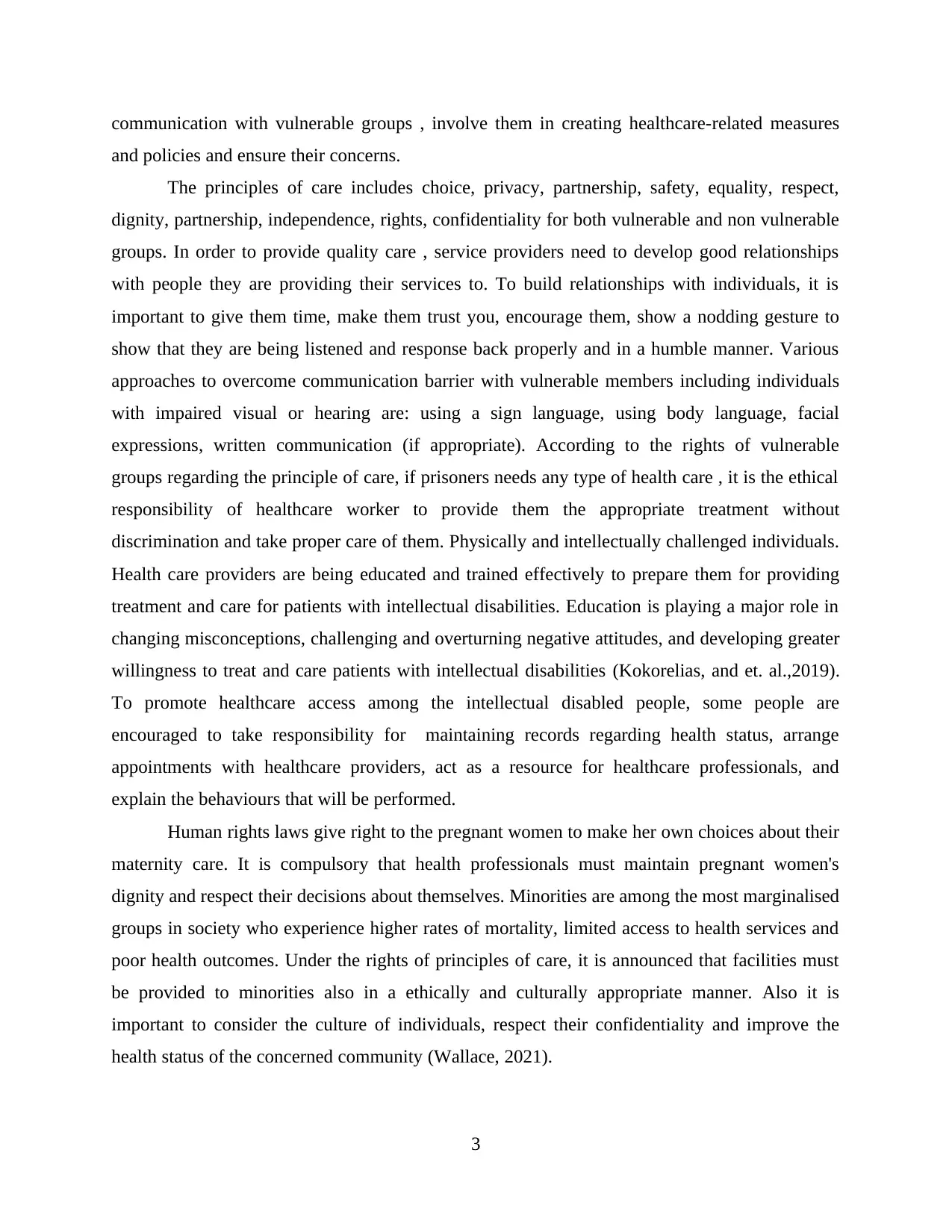
communication with vulnerable groups , involve them in creating healthcare-related measures
and policies and ensure their concerns.
The principles of care includes choice, privacy, partnership, safety, equality, respect,
dignity, partnership, independence, rights, confidentiality for both vulnerable and non vulnerable
groups. In order to provide quality care , service providers need to develop good relationships
with people they are providing their services to. To build relationships with individuals, it is
important to give them time, make them trust you, encourage them, show a nodding gesture to
show that they are being listened and response back properly and in a humble manner. Various
approaches to overcome communication barrier with vulnerable members including individuals
with impaired visual or hearing are: using a sign language, using body language, facial
expressions, written communication (if appropriate). According to the rights of vulnerable
groups regarding the principle of care, if prisoners needs any type of health care , it is the ethical
responsibility of healthcare worker to provide them the appropriate treatment without
discrimination and take proper care of them. Physically and intellectually challenged individuals.
Health care providers are being educated and trained effectively to prepare them for providing
treatment and care for patients with intellectual disabilities. Education is playing a major role in
changing misconceptions, challenging and overturning negative attitudes, and developing greater
willingness to treat and care patients with intellectual disabilities (Kokorelias, and et. al.,2019).
To promote healthcare access among the intellectual disabled people, some people are
encouraged to take responsibility for maintaining records regarding health status, arrange
appointments with healthcare providers, act as a resource for healthcare professionals, and
explain the behaviours that will be performed.
Human rights laws give right to the pregnant women to make her own choices about their
maternity care. It is compulsory that health professionals must maintain pregnant women's
dignity and respect their decisions about themselves. Minorities are among the most marginalised
groups in society who experience higher rates of mortality, limited access to health services and
poor health outcomes. Under the rights of principles of care, it is announced that facilities must
be provided to minorities also in a ethically and culturally appropriate manner. Also it is
important to consider the culture of individuals, respect their confidentiality and improve the
health status of the concerned community (Wallace, 2021).
3
and policies and ensure their concerns.
The principles of care includes choice, privacy, partnership, safety, equality, respect,
dignity, partnership, independence, rights, confidentiality for both vulnerable and non vulnerable
groups. In order to provide quality care , service providers need to develop good relationships
with people they are providing their services to. To build relationships with individuals, it is
important to give them time, make them trust you, encourage them, show a nodding gesture to
show that they are being listened and response back properly and in a humble manner. Various
approaches to overcome communication barrier with vulnerable members including individuals
with impaired visual or hearing are: using a sign language, using body language, facial
expressions, written communication (if appropriate). According to the rights of vulnerable
groups regarding the principle of care, if prisoners needs any type of health care , it is the ethical
responsibility of healthcare worker to provide them the appropriate treatment without
discrimination and take proper care of them. Physically and intellectually challenged individuals.
Health care providers are being educated and trained effectively to prepare them for providing
treatment and care for patients with intellectual disabilities. Education is playing a major role in
changing misconceptions, challenging and overturning negative attitudes, and developing greater
willingness to treat and care patients with intellectual disabilities (Kokorelias, and et. al.,2019).
To promote healthcare access among the intellectual disabled people, some people are
encouraged to take responsibility for maintaining records regarding health status, arrange
appointments with healthcare providers, act as a resource for healthcare professionals, and
explain the behaviours that will be performed.
Human rights laws give right to the pregnant women to make her own choices about their
maternity care. It is compulsory that health professionals must maintain pregnant women's
dignity and respect their decisions about themselves. Minorities are among the most marginalised
groups in society who experience higher rates of mortality, limited access to health services and
poor health outcomes. Under the rights of principles of care, it is announced that facilities must
be provided to minorities also in a ethically and culturally appropriate manner. Also it is
important to consider the culture of individuals, respect their confidentiality and improve the
health status of the concerned community (Wallace, 2021).
3
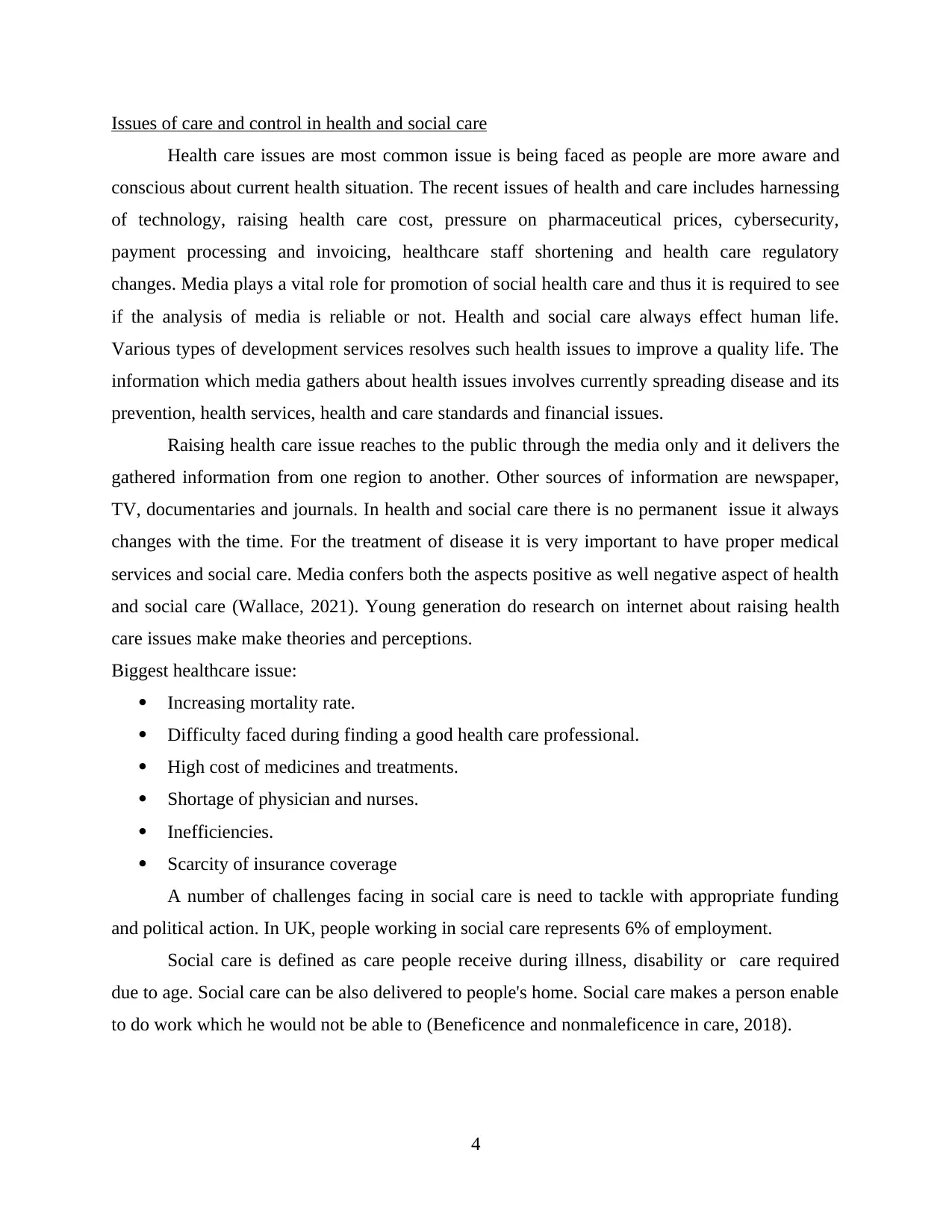
Issues of care and control in health and social care
Health care issues are most common issue is being faced as people are more aware and
conscious about current health situation. The recent issues of health and care includes harnessing
of technology, raising health care cost, pressure on pharmaceutical prices, cybersecurity,
payment processing and invoicing, healthcare staff shortening and health care regulatory
changes. Media plays a vital role for promotion of social health care and thus it is required to see
if the analysis of media is reliable or not. Health and social care always effect human life.
Various types of development services resolves such health issues to improve a quality life. The
information which media gathers about health issues involves currently spreading disease and its
prevention, health services, health and care standards and financial issues.
Raising health care issue reaches to the public through the media only and it delivers the
gathered information from one region to another. Other sources of information are newspaper,
TV, documentaries and journals. In health and social care there is no permanent issue it always
changes with the time. For the treatment of disease it is very important to have proper medical
services and social care. Media confers both the aspects positive as well negative aspect of health
and social care (Wallace, 2021). Young generation do research on internet about raising health
care issues make make theories and perceptions.
Biggest healthcare issue:
Increasing mortality rate.
Difficulty faced during finding a good health care professional.
High cost of medicines and treatments.
Shortage of physician and nurses.
Inefficiencies.
Scarcity of insurance coverage
A number of challenges facing in social care is need to tackle with appropriate funding
and political action. In UK, people working in social care represents 6% of employment.
Social care is defined as care people receive during illness, disability or care required
due to age. Social care can be also delivered to people's home. Social care makes a person enable
to do work which he would not be able to (Beneficence and nonmaleficence in care, 2018).
4
Health care issues are most common issue is being faced as people are more aware and
conscious about current health situation. The recent issues of health and care includes harnessing
of technology, raising health care cost, pressure on pharmaceutical prices, cybersecurity,
payment processing and invoicing, healthcare staff shortening and health care regulatory
changes. Media plays a vital role for promotion of social health care and thus it is required to see
if the analysis of media is reliable or not. Health and social care always effect human life.
Various types of development services resolves such health issues to improve a quality life. The
information which media gathers about health issues involves currently spreading disease and its
prevention, health services, health and care standards and financial issues.
Raising health care issue reaches to the public through the media only and it delivers the
gathered information from one region to another. Other sources of information are newspaper,
TV, documentaries and journals. In health and social care there is no permanent issue it always
changes with the time. For the treatment of disease it is very important to have proper medical
services and social care. Media confers both the aspects positive as well negative aspect of health
and social care (Wallace, 2021). Young generation do research on internet about raising health
care issues make make theories and perceptions.
Biggest healthcare issue:
Increasing mortality rate.
Difficulty faced during finding a good health care professional.
High cost of medicines and treatments.
Shortage of physician and nurses.
Inefficiencies.
Scarcity of insurance coverage
A number of challenges facing in social care is need to tackle with appropriate funding
and political action. In UK, people working in social care represents 6% of employment.
Social care is defined as care people receive during illness, disability or care required
due to age. Social care can be also delivered to people's home. Social care makes a person enable
to do work which he would not be able to (Beneficence and nonmaleficence in care, 2018).
4
⊘ This is a preview!⊘
Do you want full access?
Subscribe today to unlock all pages.

Trusted by 1+ million students worldwide
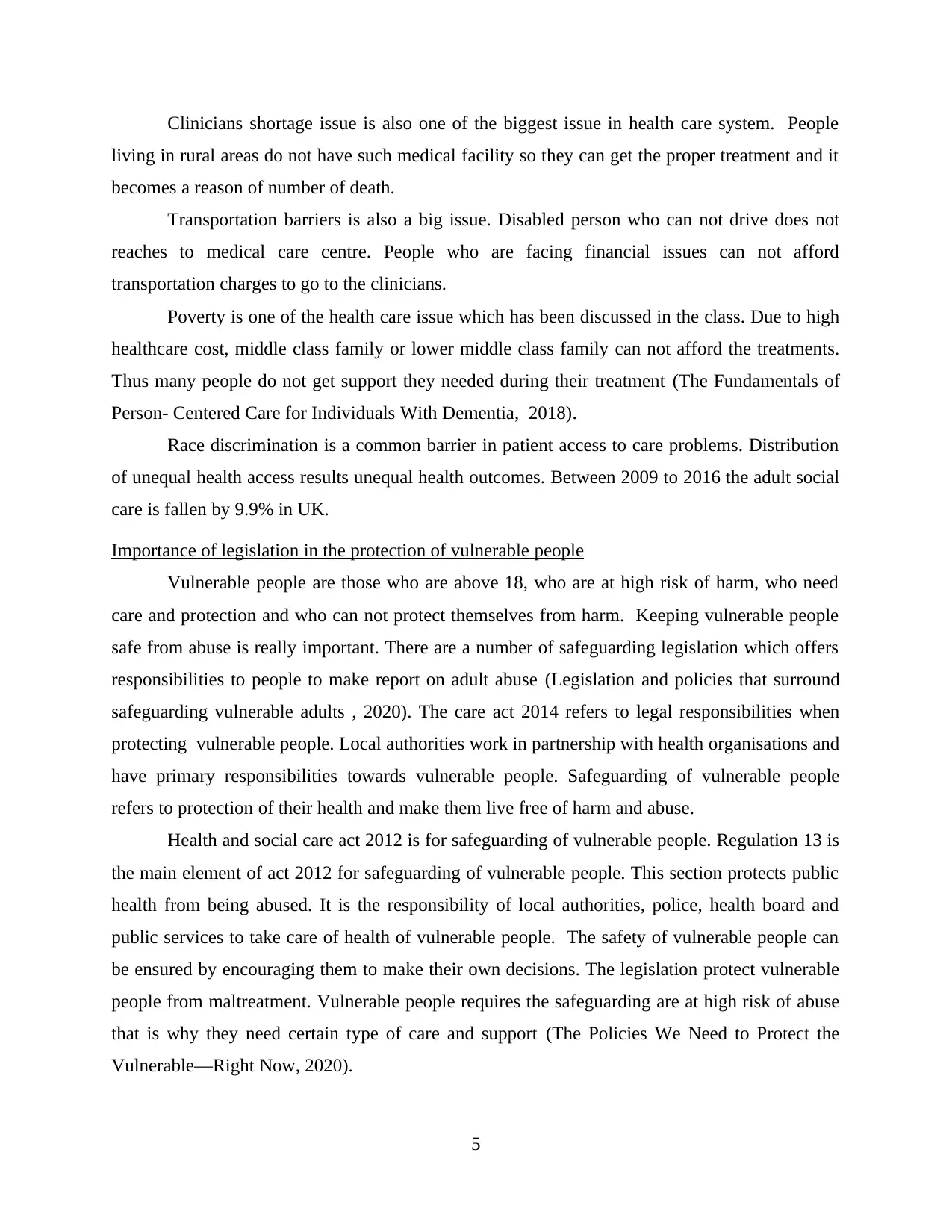
Clinicians shortage issue is also one of the biggest issue in health care system. People
living in rural areas do not have such medical facility so they can get the proper treatment and it
becomes a reason of number of death.
Transportation barriers is also a big issue. Disabled person who can not drive does not
reaches to medical care centre. People who are facing financial issues can not afford
transportation charges to go to the clinicians.
Poverty is one of the health care issue which has been discussed in the class. Due to high
healthcare cost, middle class family or lower middle class family can not afford the treatments.
Thus many people do not get support they needed during their treatment (The Fundamentals of
Person- Centered Care for Individuals With Dementia, 2018).
Race discrimination is a common barrier in patient access to care problems. Distribution
of unequal health access results unequal health outcomes. Between 2009 to 2016 the adult social
care is fallen by 9.9% in UK.
Importance of legislation in the protection of vulnerable people
Vulnerable people are those who are above 18, who are at high risk of harm, who need
care and protection and who can not protect themselves from harm. Keeping vulnerable people
safe from abuse is really important. There are a number of safeguarding legislation which offers
responsibilities to people to make report on adult abuse (Legislation and policies that surround
safeguarding vulnerable adults , 2020). The care act 2014 refers to legal responsibilities when
protecting vulnerable people. Local authorities work in partnership with health organisations and
have primary responsibilities towards vulnerable people. Safeguarding of vulnerable people
refers to protection of their health and make them live free of harm and abuse.
Health and social care act 2012 is for safeguarding of vulnerable people. Regulation 13 is
the main element of act 2012 for safeguarding of vulnerable people. This section protects public
health from being abused. It is the responsibility of local authorities, police, health board and
public services to take care of health of vulnerable people. The safety of vulnerable people can
be ensured by encouraging them to make their own decisions. The legislation protect vulnerable
people from maltreatment. Vulnerable people requires the safeguarding are at high risk of abuse
that is why they need certain type of care and support (The Policies We Need to Protect the
Vulnerable—Right Now, 2020).
5
living in rural areas do not have such medical facility so they can get the proper treatment and it
becomes a reason of number of death.
Transportation barriers is also a big issue. Disabled person who can not drive does not
reaches to medical care centre. People who are facing financial issues can not afford
transportation charges to go to the clinicians.
Poverty is one of the health care issue which has been discussed in the class. Due to high
healthcare cost, middle class family or lower middle class family can not afford the treatments.
Thus many people do not get support they needed during their treatment (The Fundamentals of
Person- Centered Care for Individuals With Dementia, 2018).
Race discrimination is a common barrier in patient access to care problems. Distribution
of unequal health access results unequal health outcomes. Between 2009 to 2016 the adult social
care is fallen by 9.9% in UK.
Importance of legislation in the protection of vulnerable people
Vulnerable people are those who are above 18, who are at high risk of harm, who need
care and protection and who can not protect themselves from harm. Keeping vulnerable people
safe from abuse is really important. There are a number of safeguarding legislation which offers
responsibilities to people to make report on adult abuse (Legislation and policies that surround
safeguarding vulnerable adults , 2020). The care act 2014 refers to legal responsibilities when
protecting vulnerable people. Local authorities work in partnership with health organisations and
have primary responsibilities towards vulnerable people. Safeguarding of vulnerable people
refers to protection of their health and make them live free of harm and abuse.
Health and social care act 2012 is for safeguarding of vulnerable people. Regulation 13 is
the main element of act 2012 for safeguarding of vulnerable people. This section protects public
health from being abused. It is the responsibility of local authorities, police, health board and
public services to take care of health of vulnerable people. The safety of vulnerable people can
be ensured by encouraging them to make their own decisions. The legislation protect vulnerable
people from maltreatment. Vulnerable people requires the safeguarding are at high risk of abuse
that is why they need certain type of care and support (The Policies We Need to Protect the
Vulnerable—Right Now, 2020).
5
Paraphrase This Document
Need a fresh take? Get an instant paraphrase of this document with our AI Paraphraser
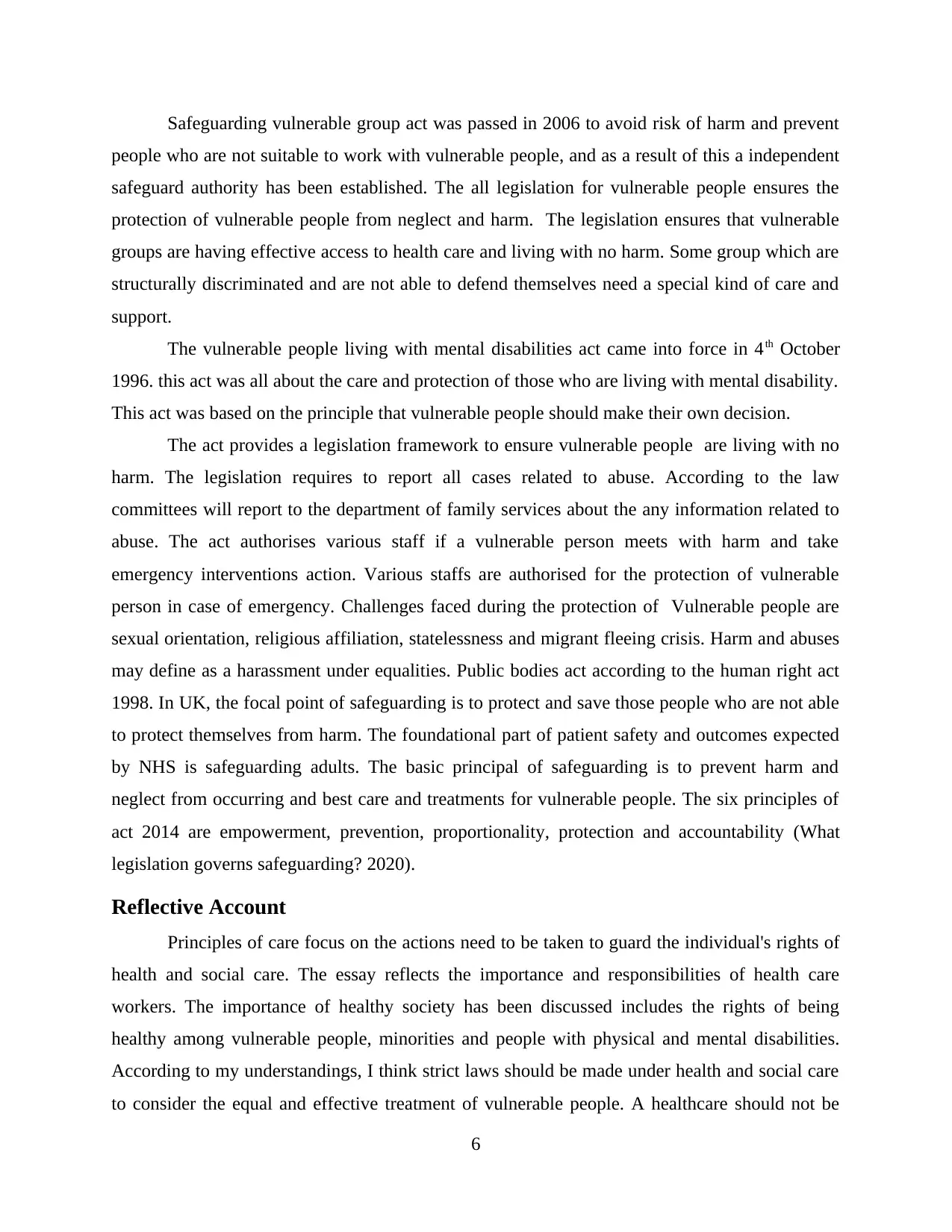
Safeguarding vulnerable group act was passed in 2006 to avoid risk of harm and prevent
people who are not suitable to work with vulnerable people, and as a result of this a independent
safeguard authority has been established. The all legislation for vulnerable people ensures the
protection of vulnerable people from neglect and harm. The legislation ensures that vulnerable
groups are having effective access to health care and living with no harm. Some group which are
structurally discriminated and are not able to defend themselves need a special kind of care and
support.
The vulnerable people living with mental disabilities act came into force in 4th October
1996. this act was all about the care and protection of those who are living with mental disability.
This act was based on the principle that vulnerable people should make their own decision.
The act provides a legislation framework to ensure vulnerable people are living with no
harm. The legislation requires to report all cases related to abuse. According to the law
committees will report to the department of family services about the any information related to
abuse. The act authorises various staff if a vulnerable person meets with harm and take
emergency interventions action. Various staffs are authorised for the protection of vulnerable
person in case of emergency. Challenges faced during the protection of Vulnerable people are
sexual orientation, religious affiliation, statelessness and migrant fleeing crisis. Harm and abuses
may define as a harassment under equalities. Public bodies act according to the human right act
1998. In UK, the focal point of safeguarding is to protect and save those people who are not able
to protect themselves from harm. The foundational part of patient safety and outcomes expected
by NHS is safeguarding adults. The basic principal of safeguarding is to prevent harm and
neglect from occurring and best care and treatments for vulnerable people. The six principles of
act 2014 are empowerment, prevention, proportionality, protection and accountability (What
legislation governs safeguarding? 2020).
Reflective Account
Principles of care focus on the actions need to be taken to guard the individual's rights of
health and social care. The essay reflects the importance and responsibilities of health care
workers. The importance of healthy society has been discussed includes the rights of being
healthy among vulnerable people, minorities and people with physical and mental disabilities.
According to my understandings, I think strict laws should be made under health and social care
to consider the equal and effective treatment of vulnerable people. A healthcare should not be
6
people who are not suitable to work with vulnerable people, and as a result of this a independent
safeguard authority has been established. The all legislation for vulnerable people ensures the
protection of vulnerable people from neglect and harm. The legislation ensures that vulnerable
groups are having effective access to health care and living with no harm. Some group which are
structurally discriminated and are not able to defend themselves need a special kind of care and
support.
The vulnerable people living with mental disabilities act came into force in 4th October
1996. this act was all about the care and protection of those who are living with mental disability.
This act was based on the principle that vulnerable people should make their own decision.
The act provides a legislation framework to ensure vulnerable people are living with no
harm. The legislation requires to report all cases related to abuse. According to the law
committees will report to the department of family services about the any information related to
abuse. The act authorises various staff if a vulnerable person meets with harm and take
emergency interventions action. Various staffs are authorised for the protection of vulnerable
person in case of emergency. Challenges faced during the protection of Vulnerable people are
sexual orientation, religious affiliation, statelessness and migrant fleeing crisis. Harm and abuses
may define as a harassment under equalities. Public bodies act according to the human right act
1998. In UK, the focal point of safeguarding is to protect and save those people who are not able
to protect themselves from harm. The foundational part of patient safety and outcomes expected
by NHS is safeguarding adults. The basic principal of safeguarding is to prevent harm and
neglect from occurring and best care and treatments for vulnerable people. The six principles of
act 2014 are empowerment, prevention, proportionality, protection and accountability (What
legislation governs safeguarding? 2020).
Reflective Account
Principles of care focus on the actions need to be taken to guard the individual's rights of
health and social care. The essay reflects the importance and responsibilities of health care
workers. The importance of healthy society has been discussed includes the rights of being
healthy among vulnerable people, minorities and people with physical and mental disabilities.
According to my understandings, I think strict laws should be made under health and social care
to consider the equal and effective treatment of vulnerable people. A healthcare should not be
6
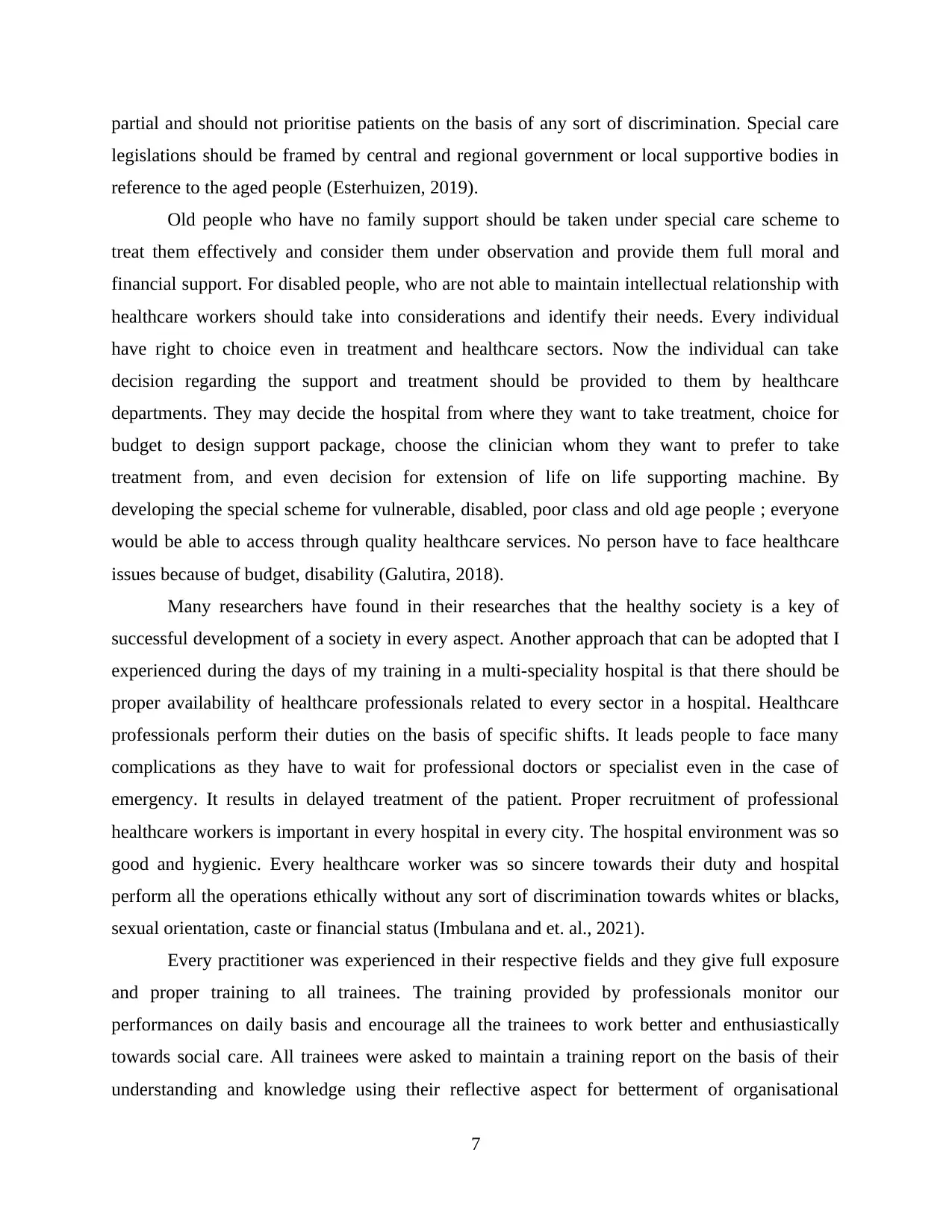
partial and should not prioritise patients on the basis of any sort of discrimination. Special care
legislations should be framed by central and regional government or local supportive bodies in
reference to the aged people (Esterhuizen, 2019).
Old people who have no family support should be taken under special care scheme to
treat them effectively and consider them under observation and provide them full moral and
financial support. For disabled people, who are not able to maintain intellectual relationship with
healthcare workers should take into considerations and identify their needs. Every individual
have right to choice even in treatment and healthcare sectors. Now the individual can take
decision regarding the support and treatment should be provided to them by healthcare
departments. They may decide the hospital from where they want to take treatment, choice for
budget to design support package, choose the clinician whom they want to prefer to take
treatment from, and even decision for extension of life on life supporting machine. By
developing the special scheme for vulnerable, disabled, poor class and old age people ; everyone
would be able to access through quality healthcare services. No person have to face healthcare
issues because of budget, disability (Galutira, 2018).
Many researchers have found in their researches that the healthy society is a key of
successful development of a society in every aspect. Another approach that can be adopted that I
experienced during the days of my training in a multi-speciality hospital is that there should be
proper availability of healthcare professionals related to every sector in a hospital. Healthcare
professionals perform their duties on the basis of specific shifts. It leads people to face many
complications as they have to wait for professional doctors or specialist even in the case of
emergency. It results in delayed treatment of the patient. Proper recruitment of professional
healthcare workers is important in every hospital in every city. The hospital environment was so
good and hygienic. Every healthcare worker was so sincere towards their duty and hospital
perform all the operations ethically without any sort of discrimination towards whites or blacks,
sexual orientation, caste or financial status (Imbulana and et. al., 2021).
Every practitioner was experienced in their respective fields and they give full exposure
and proper training to all trainees. The training provided by professionals monitor our
performances on daily basis and encourage all the trainees to work better and enthusiastically
towards social care. All trainees were asked to maintain a training report on the basis of their
understanding and knowledge using their reflective aspect for betterment of organisational
7
legislations should be framed by central and regional government or local supportive bodies in
reference to the aged people (Esterhuizen, 2019).
Old people who have no family support should be taken under special care scheme to
treat them effectively and consider them under observation and provide them full moral and
financial support. For disabled people, who are not able to maintain intellectual relationship with
healthcare workers should take into considerations and identify their needs. Every individual
have right to choice even in treatment and healthcare sectors. Now the individual can take
decision regarding the support and treatment should be provided to them by healthcare
departments. They may decide the hospital from where they want to take treatment, choice for
budget to design support package, choose the clinician whom they want to prefer to take
treatment from, and even decision for extension of life on life supporting machine. By
developing the special scheme for vulnerable, disabled, poor class and old age people ; everyone
would be able to access through quality healthcare services. No person have to face healthcare
issues because of budget, disability (Galutira, 2018).
Many researchers have found in their researches that the healthy society is a key of
successful development of a society in every aspect. Another approach that can be adopted that I
experienced during the days of my training in a multi-speciality hospital is that there should be
proper availability of healthcare professionals related to every sector in a hospital. Healthcare
professionals perform their duties on the basis of specific shifts. It leads people to face many
complications as they have to wait for professional doctors or specialist even in the case of
emergency. It results in delayed treatment of the patient. Proper recruitment of professional
healthcare workers is important in every hospital in every city. The hospital environment was so
good and hygienic. Every healthcare worker was so sincere towards their duty and hospital
perform all the operations ethically without any sort of discrimination towards whites or blacks,
sexual orientation, caste or financial status (Imbulana and et. al., 2021).
Every practitioner was experienced in their respective fields and they give full exposure
and proper training to all trainees. The training provided by professionals monitor our
performances on daily basis and encourage all the trainees to work better and enthusiastically
towards social care. All trainees were asked to maintain a training report on the basis of their
understanding and knowledge using their reflective aspect for betterment of organisational
7
⊘ This is a preview!⊘
Do you want full access?
Subscribe today to unlock all pages.

Trusted by 1+ million students worldwide
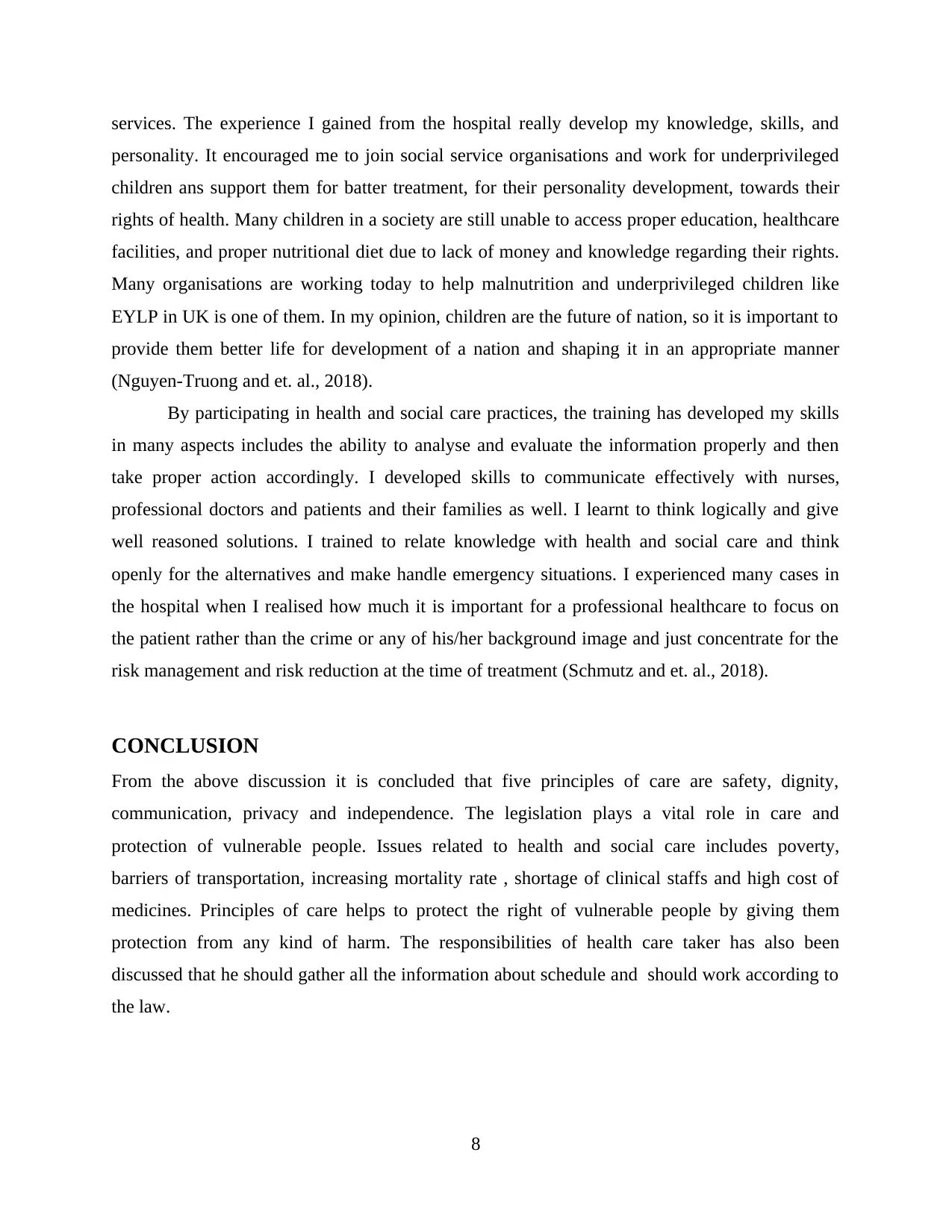
services. The experience I gained from the hospital really develop my knowledge, skills, and
personality. It encouraged me to join social service organisations and work for underprivileged
children ans support them for batter treatment, for their personality development, towards their
rights of health. Many children in a society are still unable to access proper education, healthcare
facilities, and proper nutritional diet due to lack of money and knowledge regarding their rights.
Many organisations are working today to help malnutrition and underprivileged children like
EYLP in UK is one of them. In my opinion, children are the future of nation, so it is important to
provide them better life for development of a nation and shaping it in an appropriate manner
(Nguyen-Truong and et. al., 2018).
By participating in health and social care practices, the training has developed my skills
in many aspects includes the ability to analyse and evaluate the information properly and then
take proper action accordingly. I developed skills to communicate effectively with nurses,
professional doctors and patients and their families as well. I learnt to think logically and give
well reasoned solutions. I trained to relate knowledge with health and social care and think
openly for the alternatives and make handle emergency situations. I experienced many cases in
the hospital when I realised how much it is important for a professional healthcare to focus on
the patient rather than the crime or any of his/her background image and just concentrate for the
risk management and risk reduction at the time of treatment (Schmutz and et. al., 2018).
CONCLUSION
From the above discussion it is concluded that five principles of care are safety, dignity,
communication, privacy and independence. The legislation plays a vital role in care and
protection of vulnerable people. Issues related to health and social care includes poverty,
barriers of transportation, increasing mortality rate , shortage of clinical staffs and high cost of
medicines. Principles of care helps to protect the right of vulnerable people by giving them
protection from any kind of harm. The responsibilities of health care taker has also been
discussed that he should gather all the information about schedule and should work according to
the law.
8
personality. It encouraged me to join social service organisations and work for underprivileged
children ans support them for batter treatment, for their personality development, towards their
rights of health. Many children in a society are still unable to access proper education, healthcare
facilities, and proper nutritional diet due to lack of money and knowledge regarding their rights.
Many organisations are working today to help malnutrition and underprivileged children like
EYLP in UK is one of them. In my opinion, children are the future of nation, so it is important to
provide them better life for development of a nation and shaping it in an appropriate manner
(Nguyen-Truong and et. al., 2018).
By participating in health and social care practices, the training has developed my skills
in many aspects includes the ability to analyse and evaluate the information properly and then
take proper action accordingly. I developed skills to communicate effectively with nurses,
professional doctors and patients and their families as well. I learnt to think logically and give
well reasoned solutions. I trained to relate knowledge with health and social care and think
openly for the alternatives and make handle emergency situations. I experienced many cases in
the hospital when I realised how much it is important for a professional healthcare to focus on
the patient rather than the crime or any of his/her background image and just concentrate for the
risk management and risk reduction at the time of treatment (Schmutz and et. al., 2018).
CONCLUSION
From the above discussion it is concluded that five principles of care are safety, dignity,
communication, privacy and independence. The legislation plays a vital role in care and
protection of vulnerable people. Issues related to health and social care includes poverty,
barriers of transportation, increasing mortality rate , shortage of clinical staffs and high cost of
medicines. Principles of care helps to protect the right of vulnerable people by giving them
protection from any kind of harm. The responsibilities of health care taker has also been
discussed that he should gather all the information about schedule and should work according to
the law.
8
Paraphrase This Document
Need a fresh take? Get an instant paraphrase of this document with our AI Paraphraser
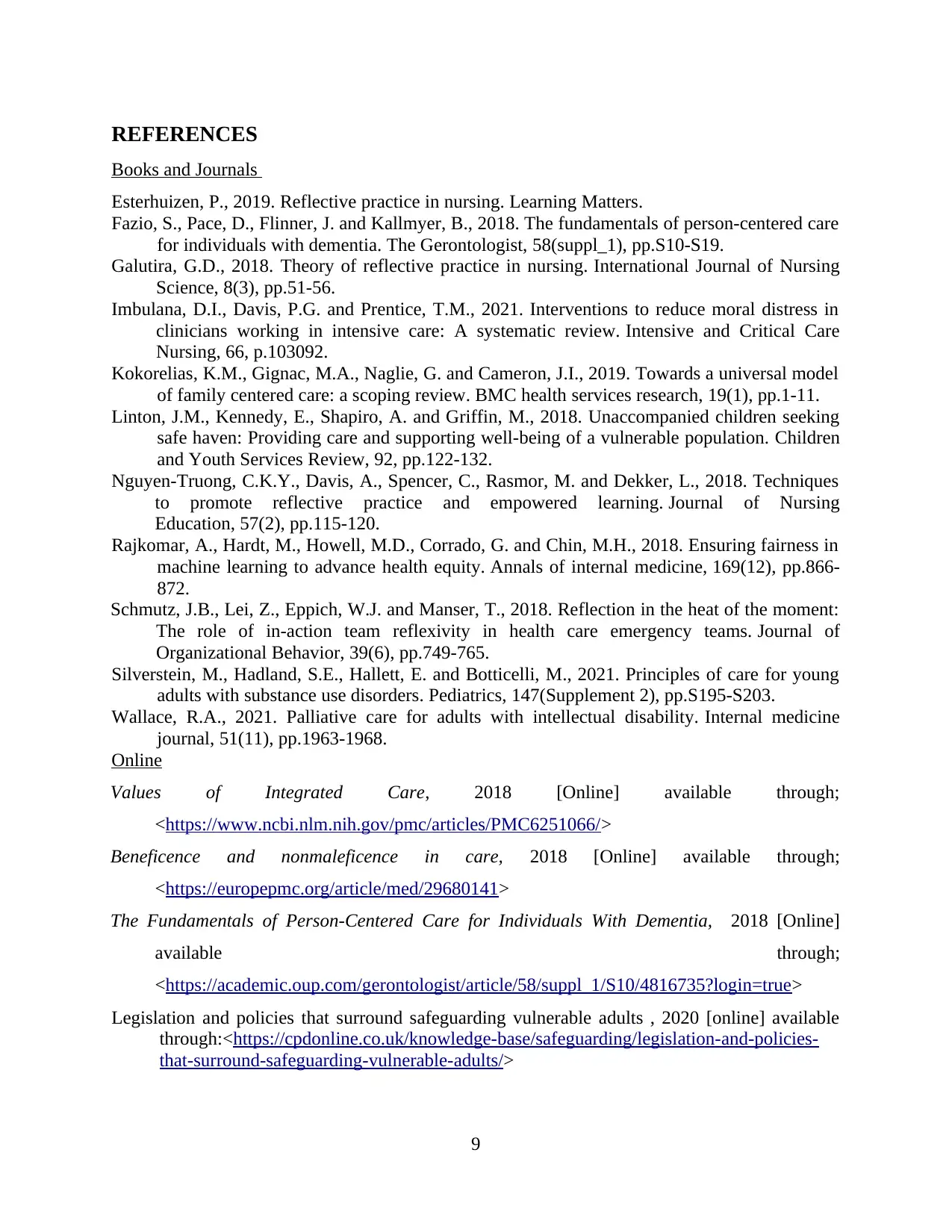
REFERENCES
Books and Journals
Esterhuizen, P., 2019. Reflective practice in nursing. Learning Matters.
Fazio, S., Pace, D., Flinner, J. and Kallmyer, B., 2018. The fundamentals of person-centered care
for individuals with dementia. The Gerontologist, 58(suppl_1), pp.S10-S19.
Galutira, G.D., 2018. Theory of reflective practice in nursing. International Journal of Nursing
Science, 8(3), pp.51-56.
Imbulana, D.I., Davis, P.G. and Prentice, T.M., 2021. Interventions to reduce moral distress in
clinicians working in intensive care: A systematic review. Intensive and Critical Care
Nursing, 66, p.103092.
Kokorelias, K.M., Gignac, M.A., Naglie, G. and Cameron, J.I., 2019. Towards a universal model
of family centered care: a scoping review. BMC health services research, 19(1), pp.1-11.
Linton, J.M., Kennedy, E., Shapiro, A. and Griffin, M., 2018. Unaccompanied children seeking
safe haven: Providing care and supporting well-being of a vulnerable population. Children
and Youth Services Review, 92, pp.122-132.
Nguyen-Truong, C.K.Y., Davis, A., Spencer, C., Rasmor, M. and Dekker, L., 2018. Techniques
to promote reflective practice and empowered learning. Journal of Nursing
Education, 57(2), pp.115-120.
Rajkomar, A., Hardt, M., Howell, M.D., Corrado, G. and Chin, M.H., 2018. Ensuring fairness in
machine learning to advance health equity. Annals of internal medicine, 169(12), pp.866-
872.
Schmutz, J.B., Lei, Z., Eppich, W.J. and Manser, T., 2018. Reflection in the heat of the moment:
The role of in‐action team reflexivity in health care emergency teams. Journal of
Organizational Behavior, 39(6), pp.749-765.
Silverstein, M., Hadland, S.E., Hallett, E. and Botticelli, M., 2021. Principles of care for young
adults with substance use disorders. Pediatrics, 147(Supplement 2), pp.S195-S203.
Wallace, R.A., 2021. Palliative care for adults with intellectual disability. Internal medicine
journal, 51(11), pp.1963-1968.
Online
Values of Integrated Care, 2018 [Online] available through;
<https://www.ncbi.nlm.nih.gov/pmc/articles/PMC6251066/>
Beneficence and nonmaleficence in care, 2018 [Online] available through;
<https://europepmc.org/article/med/29680141>
The Fundamentals of Person-Centered Care for Individuals With Dementia, 2018 [Online]
available through;
<https://academic.oup.com/gerontologist/article/58/suppl_1/S10/4816735?login=true>
Legislation and policies that surround safeguarding vulnerable adults , 2020 [online] available
through:<https://cpdonline.co.uk/knowledge-base/safeguarding/legislation-and-policies-
that-surround-safeguarding-vulnerable-adults/>
9
Books and Journals
Esterhuizen, P., 2019. Reflective practice in nursing. Learning Matters.
Fazio, S., Pace, D., Flinner, J. and Kallmyer, B., 2018. The fundamentals of person-centered care
for individuals with dementia. The Gerontologist, 58(suppl_1), pp.S10-S19.
Galutira, G.D., 2018. Theory of reflective practice in nursing. International Journal of Nursing
Science, 8(3), pp.51-56.
Imbulana, D.I., Davis, P.G. and Prentice, T.M., 2021. Interventions to reduce moral distress in
clinicians working in intensive care: A systematic review. Intensive and Critical Care
Nursing, 66, p.103092.
Kokorelias, K.M., Gignac, M.A., Naglie, G. and Cameron, J.I., 2019. Towards a universal model
of family centered care: a scoping review. BMC health services research, 19(1), pp.1-11.
Linton, J.M., Kennedy, E., Shapiro, A. and Griffin, M., 2018. Unaccompanied children seeking
safe haven: Providing care and supporting well-being of a vulnerable population. Children
and Youth Services Review, 92, pp.122-132.
Nguyen-Truong, C.K.Y., Davis, A., Spencer, C., Rasmor, M. and Dekker, L., 2018. Techniques
to promote reflective practice and empowered learning. Journal of Nursing
Education, 57(2), pp.115-120.
Rajkomar, A., Hardt, M., Howell, M.D., Corrado, G. and Chin, M.H., 2018. Ensuring fairness in
machine learning to advance health equity. Annals of internal medicine, 169(12), pp.866-
872.
Schmutz, J.B., Lei, Z., Eppich, W.J. and Manser, T., 2018. Reflection in the heat of the moment:
The role of in‐action team reflexivity in health care emergency teams. Journal of
Organizational Behavior, 39(6), pp.749-765.
Silverstein, M., Hadland, S.E., Hallett, E. and Botticelli, M., 2021. Principles of care for young
adults with substance use disorders. Pediatrics, 147(Supplement 2), pp.S195-S203.
Wallace, R.A., 2021. Palliative care for adults with intellectual disability. Internal medicine
journal, 51(11), pp.1963-1968.
Online
Values of Integrated Care, 2018 [Online] available through;
<https://www.ncbi.nlm.nih.gov/pmc/articles/PMC6251066/>
Beneficence and nonmaleficence in care, 2018 [Online] available through;
<https://europepmc.org/article/med/29680141>
The Fundamentals of Person-Centered Care for Individuals With Dementia, 2018 [Online]
available through;
<https://academic.oup.com/gerontologist/article/58/suppl_1/S10/4816735?login=true>
Legislation and policies that surround safeguarding vulnerable adults , 2020 [online] available
through:<https://cpdonline.co.uk/knowledge-base/safeguarding/legislation-and-policies-
that-surround-safeguarding-vulnerable-adults/>
9
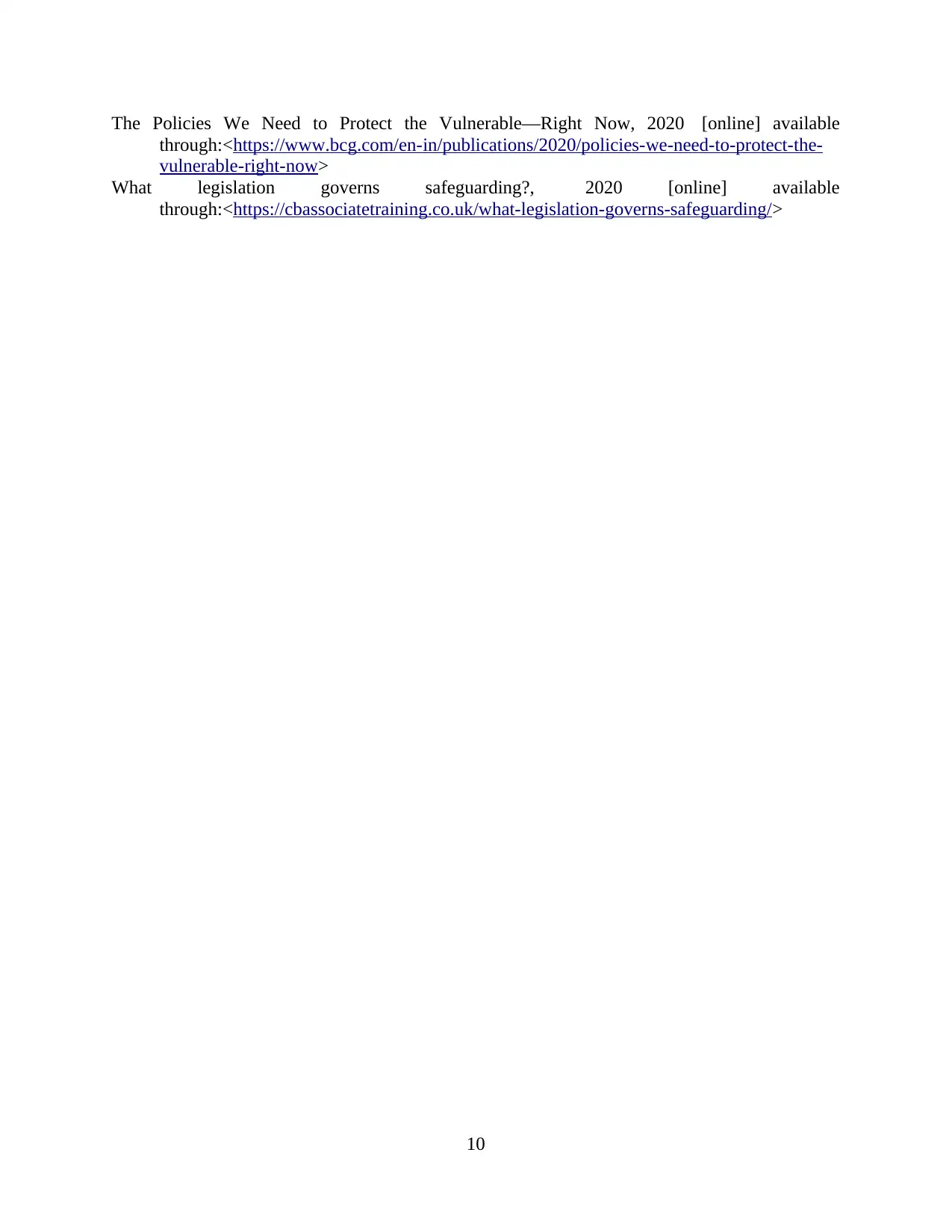
The Policies We Need to Protect the Vulnerable—Right Now, 2020 [online] available
through:<https://www.bcg.com/en-in/publications/2020/policies-we-need-to-protect-the-
vulnerable-right-now>
What legislation governs safeguarding?, 2020 [online] available
through:<https://cbassociatetraining.co.uk/what-legislation-governs-safeguarding/>
10
through:<https://www.bcg.com/en-in/publications/2020/policies-we-need-to-protect-the-
vulnerable-right-now>
What legislation governs safeguarding?, 2020 [online] available
through:<https://cbassociatetraining.co.uk/what-legislation-governs-safeguarding/>
10
⊘ This is a preview!⊘
Do you want full access?
Subscribe today to unlock all pages.

Trusted by 1+ million students worldwide
1 out of 12
Related Documents
Your All-in-One AI-Powered Toolkit for Academic Success.
+13062052269
info@desklib.com
Available 24*7 on WhatsApp / Email
![[object Object]](/_next/static/media/star-bottom.7253800d.svg)
Unlock your academic potential
Copyright © 2020–2026 A2Z Services. All Rights Reserved. Developed and managed by ZUCOL.


